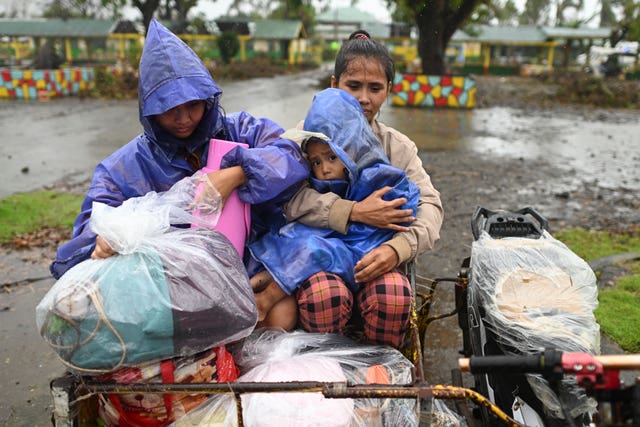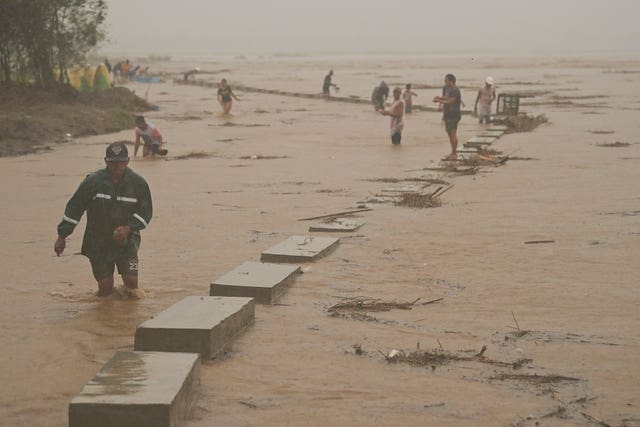
The fifth major storm in three weeks has slammed into the north-eastern Philippines, prompting more evacuations and a United Nations call for emergency funds to help the government address the plight of rural villagers.
Typhoon Usagi had sustained winds of up to 109mph and gusts of up to 149mph when it roared into the coastal town of Baggao in Cagayan province at the northern tip of Luzon, the country’s most populous agricultural region.
Locally named Ofel, the typhoon was barrelling north west and was forecast to blow away overnight towards southern Taiwan.
Another storm was brewing in the Pacific and may hit the northern Philippines this weekend, according to forecasters.

The country’s weather agency warned of life-threatening tidal surges of more than 3m (nearly 10ft) in coastal areas of Cagayan and seven other nearby provinces and clusters of islands, and urged all ships to remain in port or immediately take shelter.
Typhoon Toraji blew away from the northern Philippines just two days ago after unleashing floods, knocking down power lines and forcing more than 82,500 people to evacuate their homes.
The government has struggled to deal with the impact of the last four major storms, which left at least 160 people dead, displaced millions and devastated farmland and infrastructure, mostly in the northern Luzon region.
President Ferdinand Marcos Jr’s administration has spent more than 1 billion pesos (£13.4 million) on food and other aid for hundreds of thousands of storm victims, welfare assistant secretary Irene Dumlao said.
Defence secretary Gilberto Teodoro, who oversees disaster response efforts, sought the help of neighbouring countries, including Singapore, Indonesia, Malaysia and Brunei, in providing additional aircraft to transport food, water and other aid to villages isolated by the storms.
The United States, Manila’s long-time treaty ally, deployed cargo aircraft with food and other assistance.

The UN Humanitarian Country Team in the Philippines said it was raising 32.9 million dollars (£26m) to help the government provide assistance to about 210,000 people in critical need of aid and protection, especially women, children and people with disabilities, in the next three months.
“The Philippines is facing an exceptionally challenging tropical cyclone season, with successive cyclones reaching unprecedented locations and scales,” the UN team said in its emergency plan. “Local authorities, who are often impacted themselves, are overwhelmed as they simultaneously respond to the crisis and coordinate rescue efforts for affected families.”
The Philippines is battered by about 20 typhoons and tropical storms each year. It is often hit by earthquakes and has more than a dozen active volcanoes, making it one of the world’s most disaster-prone countries.
In 2013, Typhoon Haiyan, one of the strongest recorded tropical cyclones, left more than 7,300 people dead or missing, flattened entire villages and caused ships to run aground and smash into houses in the central Philippines.


Why are you making commenting on The National only available to subscribers?
We know there are thousands of National readers who want to debate, argue and go back and forth in the comments section of our stories. We’ve got the most informed readers in Scotland, asking each other the big questions about the future of our country.
Unfortunately, though, these important debates are being spoiled by a vocal minority of trolls who aren’t really interested in the issues, try to derail the conversations, register under fake names, and post vile abuse.
So that’s why we’ve decided to make the ability to comment only available to our paying subscribers. That way, all the trolls who post abuse on our website will have to pay if they want to join the debate – and risk a permanent ban from the account that they subscribe with.
The conversation will go back to what it should be about – people who care passionately about the issues, but disagree constructively on what we should do about them. Let’s get that debate started!
Callum Baird, Editor of The National
Comments: Our rules
We want our comments to be a lively and valuable part of our community - a place where readers can debate and engage with the most important local issues. The ability to comment on our stories is a privilege, not a right, however, and that privilege may be withdrawn if it is abused or misused.
Please report any comments that break our rules.
Read the rules hereLast Updated:
Report this comment Cancel